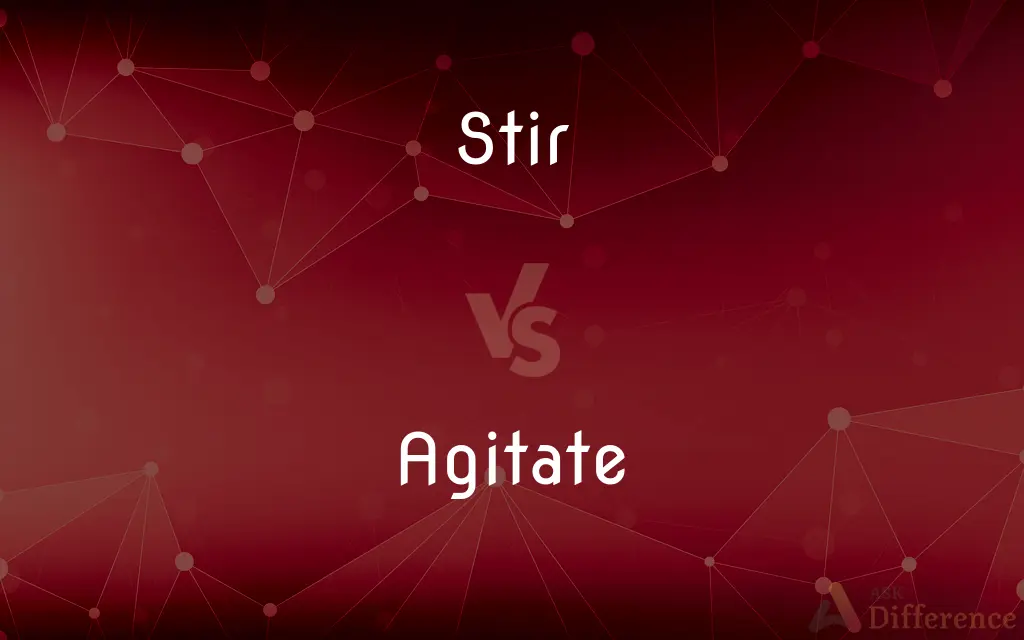Stir vs. Agitate — What's the Difference?
By Fiza Rafique & Urooj Arif — Updated on April 20, 2024
Stir involves gently mixing a substance to combine ingredients or promote cooling, while agitate refers to a vigorous, often rapid movement to mix or disturb a substance.

Difference Between Stir and Agitate
Table of Contents
ADVERTISEMENT
Key Differences
Stirring is typically a calm and controlled method used in cooking to evenly mix ingredients, such as stirring sugar into coffee. Whereas, agitation involves more forceful actions that can cause substances to move turbulently, often used in washing machines to clean clothes.
In the context of chemistry, stirring is often employed to mix solutions gently or to facilitate a reaction by slow addition of reagents, while agitation is used to speed up reactions or mixing under more vigorous conditions.
Stirring can be performed with a simple spoon or stick, aiming for a smooth and consistent motion to avoid spilling. On the other hand, agitation might require mechanical devices like agitators or shakers to achieve the desired intensity.
When discussing psychological effects, stirring generally implies arousing feelings or thoughts gently and subtly, whereas agitating suggests causing more intense and often distressing emotional responses.
The choice between stirring and agitating often depends on the desired outcome in the mixture's consistency or the emotional impact on an audience.
ADVERTISEMENT
Comparison Chart
Intensity
Low, gentle
High, vigorous
Common Uses
Cooking, gentle mixing in labs
Washing machines, mixing in industrial processes
Tools Used
Spoon, stirrer
Agitator, shaker
Psychological Impact
Gently arousing
Distressing or intense arousal
Desired Outcome
Smooth, even mixture
Rapid, thorough mixing
Compare with Definitions
Stir
To mix gently with a spoon or stick.
Stir the soup to evenly distribute the heat.
Agitate
To campaign or strive for a political cause.
They agitated for voting rights.
Stir
To cause light movement in a liquid or substance.
The breeze stirred the surface of the lake.
Agitate
To shake a liquid rapidly.
Agitate the solution well before use to ensure it is mixed.
Stir
To move one's hand or an object in a circular pattern.
She stirred her tea slowly while thinking.
Agitate
To stir up public discussion or action.
The activist agitated for change in community policies.
Stir
To disturb the position of something slightly.
He stirred the papers on his desk looking for his notes.
Agitate
To move something vigorously or violently.
The machine agitates the laundry to remove stains.
Stir
To rouse to activity or heightened emotional states.
The speaker's words stirred the crowd.
Agitate
To disturb or excite emotionally.
The controversial debate agitated the viewers.
Stir
Move a spoon or other implement round in (a liquid or other substance) in order to mix it thoroughly
Pour in the cream and stir well
Desmond stirred his tea and ate a biscuit
Agitate
To cause to move with violence or sudden force.
Stir
Move or cause to move slightly
Nothing stirred except the wind
A gentle breeze stirred the leaves
Cloudiness is caused by the fish stirring up mud
Agitate
To upset; disturb
Was agitated by the alarming news.
Stir
Arouse strong feeling in (someone); move or excite
He stirred up the sweating crowd
They will be stirred to action by what is written
Agitate
To arouse interest in (a cause, for example) by use of the written or spoken word; discuss or debate.
Stir
A slight physical movement
I stood, straining eyes and ears for the faintest stir
Agitate
To stir up public interest in a cause
Agitate for a tax reduction.
Stir
A commotion
The event caused quite a stir
Agitate
(transitive) To disturb or excite; to perturb or stir up (a person).
He was greatly agitated by the news.
Stir
An act of stirring food or drink
He gives his Ovaltine a stir
Agitate
(transitive) To cause to move with a violent, irregular action; to shake.
The wind agitates the sea
To agitate water in a vessel
Stir
Prison
I've spent twenty-eight years in stir
Agitate
To set in motion; to actuate.
Stir
To pass an implement through (a liquid, for example), usually in circular motions, so as to mix or cool the contents
Stirred the soup before tasting it.
Agitate
To discuss or debate.
Stir
To use an implement to move or rearrange the fuel in (a fire) to increase light or heat.
Agitate
To revolve in the mind, or view in all its aspects; to consider, to devise.
Politicians agitate desperate designs
Stir
To add or mix in (an ingredient, for example) into a liquid or mixture by moving an implement
Stirred a cup of sugar into the cake batter.
Agitate
To move with a violent, irregular action; as, the wind agitates the sea; to agitate water in a vessel.
Stir
To mix together the ingredients of (a liquid, for example) before cooking or use by moving an implement
Stirred up some popover batter.
Stirred the paint.
Agitate
To move or actuate.
Stir
To move or pass (an implement) through a liquid in order to mix or cool the contents
Stirred her spoon in her coffee.
Agitate
To stir up; to disturb or excite; to perturb; as, he was greatly agitated.
The mind of man is agitated by various passions.
Stir
To cause to move or shift, especially slightly or with irregular motion
A breeze stirred the branches.
Agitate
To discuss with great earnestness; to debate; as, a controversy hotly agitated.
Stir
To cause to become active; bestir
Stirred themselves to fix breakfast.
Agitate
To revolve in the mind, or view in all its aspects; to contrive busily; to devise; to plot; as, politicians agitate desperate designs.
Stir
To excite strong feelings in or rouse, as from indifference
The speaker stirred us to volunteer at the homeless shelter.
Agitate
Try to stir up public opinion
Stir
To provoke deliberately; incite. Often used with up
Stir up trouble.
Agitate
Cause to be agitated, excited, or roused;
The speaker charged up the crowd with his inflammatory remarks
Stir
To change position slightly
The leaves were stirring in the breeze.
Agitate
Exert oneself continuously, vigorously, or obtrusively to gain an end or engage in a crusade for a certain cause or person; be an advocate for;
The liberal party pushed for reforms
She is crusading for women's rights
The Dean is pushing for his favorite candidate
Stir
To start to move, especially in rising from sleep
The house was quiet, as no one had stirred yet.
Agitate
Move very slightly;
He shifted in his seat
Stir
To move about actively or busily
People were stirring about the office.
Agitate
Move or cause to move back and forth;
The chemist shook the flask vigorously
My hands were shaking
Stir
To move away from a customary or usual place or position
Instructed the guards not to stir from their posts.
Agitate
Change the arrangement or position of
Stir
To stir or mix a liquid or mixture
Stood at the counter stirring.
Stir
To be capable of being stirred
A mixture that stirs easily.
Stir
To happen or begin
When the civil rights movement first stirred.
Stir
To be roused or affected by strong feelings
"His wrath so stirred within him, that he could have struck him dead" (Charles Dickens).
Stir
A stirring, mixing, or poking movement
Gave the fire a stir.
Stir
A slight movement
Slept soundly and barely made a stir.
Stir
An excited reaction or commotion
The news caused quite a stir in our family.
Stir
Prison.
Stir
(transitive) To disturb the relative position of the particles of (a liquid or similar) by passing an object through it.
She stirred the pudding with a spoon.
He stirred his coffee so the sugar wouldn't stay at the bottom.
Stir
(transitive) To disturb the content of (a container) by passing an object through it.
Would you please stir this pot so that the chocolate doesn't burn?
Stir
(transitive) To incite to action.
Stir
(transitive) To bring into debate; to agitate.
Stir
To disturb, to disrupt.
Stir
To change the place of in any manner; to move.
Stir
(intransitive) To begin to move, especially gently, from a still or unmoving position.
Stir
(intransitive) Of a feeling or emotion: to rise, begin to be felt.
Stir
(intransitive) To be in motion; to be active or bustling; to exert or busy oneself.
Stir
(intransitive) To rise from sleep or unconsciousness.
Stir
The act or result of stirring (moving around the particles of a liquid etc.)
Can you give the soup a little stir?
Stir
Agitation; tumult; bustle; noise or various movements.
Stir
Public disturbance or commotion; tumultuous disorder; seditious uproar.
Stir
Agitation of thoughts; conflicting passions.
Stir
(slang) Jail; prison.
He's going to be spending maybe ten years in stir.
Stir
To change the place of in any manner; to move.
My foot I had never yet in five days been able to stir.
Stir
To disturb the relative position of the particles of, as of a liquid, by passing something through it; to agitate; as, to stir a pudding with a spoon.
My mind is troubled, like a fountain stirred.
Stir
To bring into debate; to agitate; to moot.
Stir not questions of jurisdiction.
Stir
To move; to change one's position.
I had not power to stir or strive,But felt that I was still alive.
Stir
To be in motion; to be active or bustling; to exert or busy one's self.
All are not fit with them to stir and toil.
The friends of the unfortunate exile, far from resenting his unjust suspicions, were stirring anxiously in his behalf.
Stir
To become the object of notice; to be on foot.
They fancy they have a right to talk freely upon everything that stirs or appears.
Stir
To rise, or be up, in the morning.
Stir
The act or result of stirring; agitation; tumult; bustle; noise or various movements.
Why all these words, this clamor, and this stir?
Consider, after so much stir about genus and species, how few words we have yet settled definitions of.
Stir
Public disturbance or commotion; tumultuous disorder; seditious uproar.
Being advertised of some stirs raised by his unnatural sons in England.
Stir
Agitation of thoughts; conflicting passions.
Stir
A disorderly outburst or tumult;
They were amazed by the furious disturbance they had caused
Stir
Emotional agitation and excitement
Stir
A rapid bustling commotion
Stir
Move an implement through with a circular motion;
Stir the soup
Stir my drink
Stir
Move very slightly;
He shifted in his seat
Stir
Stir feelings in;
Stimulate my appetite
Excite the audience
Stir emotions
Stir
Stir the feelings, emotions, or peace of;
These stories shook the community
The civil war shook the country
Stir
Affect emotionally;
A stirring movie
I was touched by your kind letter of sympathy
Stir
Evoke or call forth, with or as if by magic;
Raise the specter of unemployment
He conjured wild birds in the air
Stir a disturbance
Call down the spirits from the mountain
Stir
To begin moving,
As the thunder started the sleeping children began to stir
Stir
Mix or add by stirring;
Stir nuts into the dough
Common Curiosities
Which is more likely to cause spillage, stirring or agitating?
Agitating, due to its vigorous nature, is more likely to cause spillages compared to the gentle process of stirring.
What psychological effects do stirring and agitating have?
Stirring often gently arouses emotions or thoughts, whereas agitating can lead to more intense emotional responses.
What kind of emotional response does stirring aim to achieve in an audience?
Stirring aims to subtly arouse or inspire an audience without overwhelming them.
Are there industrial applications where both stirring and agitating are used?
Yes, many industries use both techniques depending on the process requirements, such as in pharmaceuticals or food processing.
What is the main difference in motion between stir and agitate?
Stirring involves gentle, often circular motions, while agitating is a vigorous and sometimes violent action.
Can both stirring and agitating be used in cooking?
Yes, stirring is common for combining ingredients softly, while agitating is used when a more forceful mixing is needed, like in a dressing.
Can stirring be effective in chemical reactions?
Yes, stirring is often used in chemistry to mix solutions gently or control reaction rates.
How does agitation affect the cleaning process in machines?
Agitation enhances the cleaning efficiency by vigorously moving clothes or other items to remove dirt.
In what situations would one prefer stirring over agitating?
Stirring is preferred when dealing with delicate ingredients or when trying to avoid aeration.
How do the tools used for stirring and agitating differ?
Stirring typically uses simple tools like spoons or sticks, whereas agitating often requires mechanical devices like agitators.
Is agitation always negative?
Not necessarily, agitation can be positive in contexts like mixing substances thoroughly or energizing a crowd.
Can stirring and agitating be used interchangeably in any context?
While they can both mix, the choice depends on the desired intensity and effect, making them not always interchangeable.
Which technique is more energy-intensive?
Agitating generally requires more energy due to its vigorous nature.
What is the result of agitating a political or social issue?
Agitating a political issue typically aims to spark significant public action or debate.
How does stirring affect the texture of food?
Stirring helps achieve a smooth and even texture in mixtures like sauces or soups.
Share Your Discovery

Previous Comparison
Holocaust vs. Shoah
Next Comparison
Hypersensitivity vs. AllergyAuthor Spotlight
Written by
Fiza RafiqueFiza Rafique is a skilled content writer at AskDifference.com, where she meticulously refines and enhances written pieces. Drawing from her vast editorial expertise, Fiza ensures clarity, accuracy, and precision in every article. Passionate about language, she continually seeks to elevate the quality of content for readers worldwide.
Co-written by
Urooj ArifUrooj is a skilled content writer at Ask Difference, known for her exceptional ability to simplify complex topics into engaging and informative content. With a passion for research and a flair for clear, concise writing, she consistently delivers articles that resonate with our diverse audience.













































